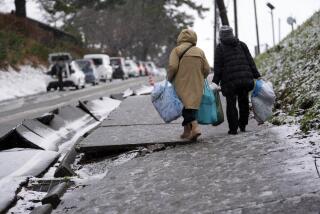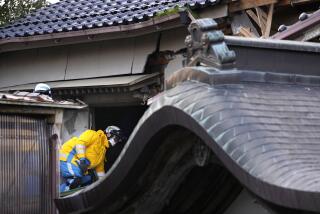Japanese restraint is steeped in a culture of tested resilience
First a massive earthquake and a devastating tsunami. Now a battle with an out-of-control nuclear reactor facility. How much can one people take?
Though there’s obviously a limit to what anyone can bear, cultural features of a society can clearly influence psychological resilience, experts say. As the tragedy drags into a second week, they warn that prolonged stress will lead to heightened trauma for many Japanese people and that levels of sadness and depression will grow.
But right now, as they witness workers risking their lives to bring a crippled nuclear power plant under control or the calm and orderly refugee centers, those who know the culture well says Japan appears to be living up to its reputation for strength and stoicism — a quality they refer to as gaman.
“It means that you have to suffer, you have to hold it in, not let it out,” says Robert Brasch, a Japanese American businessman and president of Pacific Partners Inc., a company based in Marina del Rey. “Hang tough. Be tough.”
The stoicism is deeply rooted in the country’s history, says Roland Kelts, a lecturer at the University of Tokyo and author of the 2006 book “Japanamerica.” Japan, he notes, has been plagued throughout history by volcanoes, earthquakes, tsunamis and invasions. Disaster and calamities feature commonly in its stories and folk tales. “There is a great deal of pride in the idea that Japan is a long-suffering nation,” Kelts says.
Brasch, for example, grew up in a small fishing village in Japan. He saw gaman in action at the end of World War II. At age 7, he remembers his father returning home from his job 60 miles away in bombed-out Tokyo on foot. His father would tell him in the years that followed of how everyone pitched in and helped each other.
The quality may be rooted in centuries of necessary cooperation as people strove to build a successful farming industry on a rugged landscape, adds Brasch, who is former chairman of the Japan America Society of Southern California.
“With the whole irrigation system, there had to be coordination,” he says. “The villages all had to work together. They are used to working together, being a team — not taking advantage of each other. That sort of translates itself into the society today in many ways.”
In Japan, adds Kelts, space is at a premium and people learn to cooperate and share. Selfishness, as anywhere, exists, but people value social harmony over the more American value of independence. And that means somewhat subjugating personal desires. That may be why there are few reports from the stricken areas of looting, violence, scams or people trying to take advantage of each other.
“The premium placed on social harmony can prove to be an asset in a crisis like this, he says. “There is much more of an every-person-for-himself mentality in the United States.” Japanese society too tends to take its cues from its oldest members, Brasch said, who are proud of the way the society was rebuilt after the war.
The country also may be motivated to show the world its competence, he says. “There will be a loss of face if this reactor thing gets completely out of control.”
Of course, the region’s history of earthquakes — it is far more seismically active than quake-prone California — has fostered an ability to handle sudden chaos, says Ulrike Schaede, a professor of Japanese business at UC San Diego who lives part of the year in Japan. Schaede, who returned to San Diego five days after the March 10 earthquake, was in the household goods section of a Tokyo department store when the temblor struck.
“It was clear immediately that this was not the normal shake,” she says. “But nobody screamed. The department store staff was earthquake-drilled. They calmly said, ‘Sit down. Everyone sit down.’ ” One store employee pressed his body against a cabinet holding knives in order to stop them from flying off the shelves. “That was his responsibility. That was his job. That is what he did,” Schaede says.
It’s not that people aren’t scared or upset. Japanese people can become very emotional in private, experts say. But they learn as children that there is a certain way to act: Share your opinions and feelings to family and friends at home. Keep them to yourself when in public.
“People sometimes make some fun about the rigid societal structures of Japan and how there is so much emphasis on appearance and ‘face,’ and that you don’t show your inner feelings. That is the stereotypical picture,” Schaede says. But in times like this, she adds, “that is where they get their strength. This is a helpful feature right now.”
Within 24 hours of returning to San Diego, Schaede says, she was stunned by the different tenor of the U.S. media coverage compared with that in Japan. The news coverage in Japan is calm and matter-of-fact, while some of the U.S. media’s coverage is “hysterical,” she says.
Hiroe Cawthon grew up in Japan but has lived in the United States since 2000. She says she was surprised by how Americans responded so chaotically when Hurricane Katrina struck New Orleans.
“Compared to that, I think the Japanese people are very strong,” says Cawthon, who works with international students at UC Riverside.
Cawthon recalls watching a televised report from the badly damaged area of Minamisanriku as an elderly man was rescued three days after the tsunami. “He had a big smile on his face. He said, ‘We’ll be OK. We will rebuild everything.’ Seeing that meant a lot to me.”
But the brave front may hide deeper turmoil, said Shinobu Kitayama, a psychologist and director of the Cultural Cognition Program at the University of Michigan. Kitayama was raised in Japan and taught there. He says the lack of information coming from the government and its reassurances that everything is all right reflects the potential downside of traditional Japanese courage.
“I have the general impression that Japan is in a state of collective denial,” he says. “There is a very interesting phenomenon in East Asia, in that people never get surprised. They say, ‘Didn’t you know that would happen? I knew that,’ when anything negative happens.”
Kitayama’s studies show that Americans have higher self-esteem and happiness levels compared with many countries, including Japan. “Compared to Americans, they may come out as pessimistic and more depressed,” Kitayama says. “They use this strategy to deal with some problems. But the magnitude of this event means a lot of people will eventually suffer from [post-traumatic stress disorder] and depression.”
Though the Japanese have coped remarkably in the early days of the disaster, what happens to their spirit as the weeks and months unfold remains to be seen, Kelts said.
“There is restraint and grace, but there is a certain degree of shellshock,” he says. “I think people are still stunned that their world changed in a single afternoon.”
More to Read
Start your day right
Sign up for Essential California for news, features and recommendations from the L.A. Times and beyond in your inbox six days a week.
You may occasionally receive promotional content from the Los Angeles Times.






